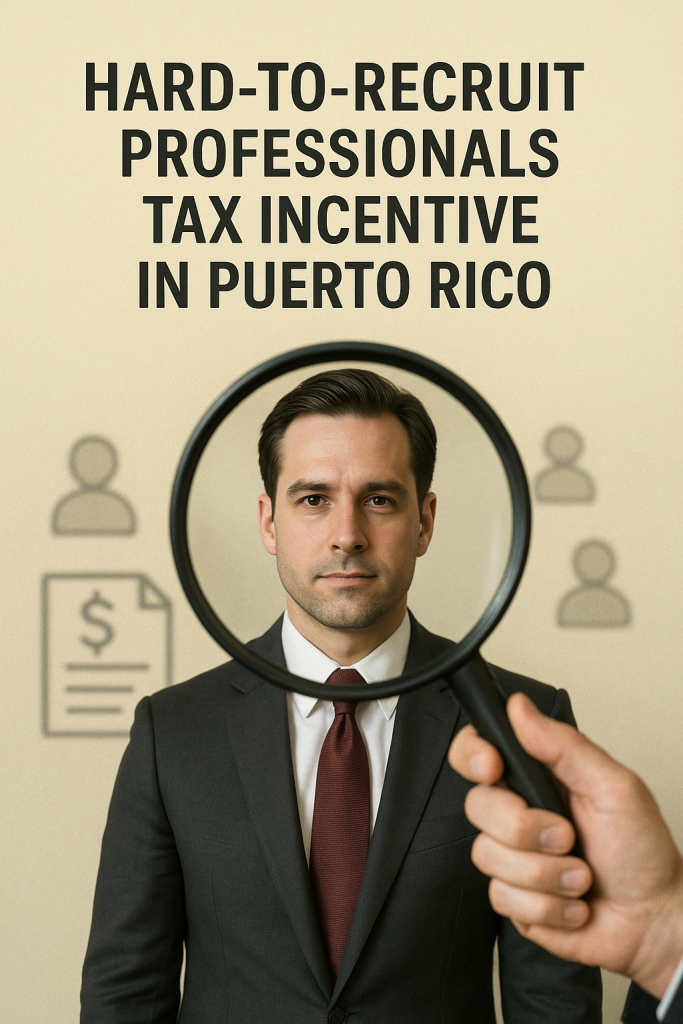Introduction
Under Section 2021.02 of Law 60-2019, hard-to-recruit professionals who provide essential knowledge and skills for the operations of an exempt business can access tax benefits. This section aims to attract highly qualified individuals crucial to the business’s success. The filing fee for Professionals of Difficult Recruitment under Act No. 60-2019, Section 2021.02, is $3,000.00. Below are the benefits and answers to common questions to maximize tax advantages.
1. What are the tax benefits for hard-to-recruit professionals?
Hard-to-recruit professionals may enjoy:
- Tax exemption on income from salary or compensation if their expertise and skills are essential for the exempt business’s operations.
- Tax reduction on personal income or gains to incentivize hiring in key areas.
- Additional tax benefits if the professional conducts research or development that generates significant value for the business.
2. What tax credits or benefits can my business obtain by hiring new workers?
If your business hires hard-to-recruit professionals, you may benefit from:
- Tax credits or exemptions on the income of hired employees if they are essential to the exempt business.
- Additional tax incentives for hiring in specialized fields like engineering, sciences, or technology, which are hard to recruit in Puerto Rico.
- Tax benefits if new employees are experts in key sectors, such as consultants or high-level specialists.
3. Are there benefits for investing in equipment or properties?
Yes, by investing in equipment or properties, you can obtain:
- Tax exemptions on the purchase of equipment or properties needed for hard-to-recruit professionals to perform efficiently, such as high-tech tools.
- Additional tax benefits if equipment is used in technological innovation or research and development.
- Tax credits for purchasing property used in key projects led by these professionals.
4. Can I save on taxes by making my business more eco-friendly?
If the hired professional develops eco-friendly solutions, you may benefit from:
- Tax credits for implementing clean technologies or improving energy efficiency.
- Tax benefits if projects led by these professionals reduce environmental impact or introduce renewable energy technologies.
5. What additional tax benefits can my business type enjoy? Including investors.
In addition to benefits for hired professionals, your business and investors may enjoy:
- Tax exemptions on income from key operations reliant on these professionals.
- Additional tax benefits if investors are active in hard-to-recruit industries or strategically aligned sectors.
- Tax reductions on income from investments in sectors like technology, biotechnology, or innovation.
6. Do I qualify for additional benefits if I operate in a specific zone or area?
Yes, if your business is in a priority economic development zone or opportunity zone in Puerto Rico:
- Additional tax exemptions if the professional is located in these zones or the business is in an innovation zone.
- Tax incentives for operating in strategic areas like industrial parks, technology zones, or clean energy zones.
- Tax benefits if operations generate high-quality jobs or contribute to regional economic expansion.
7. What is available for research or innovation expenses?
If the professional is involved in research or innovation:
- Tax credits for research and development (R&D) expenses in areas like biotechnology, renewable energy, or emerging technologies.
- Tax exemptions on income from intellectual property developed by these professionals.
- Tax incentives if the research advances technology or develops new commercial solutions.
8. Are there tax exemptions for expanding or relocating my business?
Yes, if you expand or relocate your business in Puerto Rico, especially in key areas:
- Tax exemptions on property if the expansion includes facilities like laboratories or research offices.
- Additional tax credits if relocation creates qualified jobs in hard-to-recruit sectors.
- Tax benefits if relocation is to priority economic development zones, such as technological innovation zones.
9. How can I benefit from exporting goods or services?
If your business exports goods or services reliant on hard-to-recruit professionals:
- Tax exemptions on income from exporting innovative or high-tech products.
- Additional tax benefits if projects target exporting advanced technological solutions to international markets.
- Tax credits for expanding international operations that positively impact Puerto Rico’s economy.
10. Which professionals might qualify as hard-to-recruit?
Professionals who might qualify include those with essential and hard-to-find skills in Puerto Rico, such as:
- Engineers (industrial, mechanical, electrical, software) in critical technical or technological processes.
- Scientists in biotechnology, pharmaceuticals, chemistry, or renewable energy, involved in R&D.
- Technologists in IT, artificial intelligence, cybersecurity, or advanced software development.
- Medical and health specialists in medical research or health technologies.
- Specialized consultants in finance, logistics, or innovative project management.
- Sustainability experts developing eco-friendly solutions.
- Researchers in technological innovation or intellectual property.
- Export professionals leading innovative goods or services projects.
Key criteria: Must be essential to the exempt business, hard to recruit locally, and prioritized in sectors like technology, biotechnology, or renewable energy.
11. Can professionals in construction advertising or goldsmithing qualify?
Yes, they could qualify if:
- Their skills are essential to an exempt business and hard to recruit in Puerto Rico.
- Construction advertising: A digital marketing specialist for real estate projects could qualify if the business is in an opportunity zone or generates significant economic impact.
- e.g. Goldsmithing: A master goldsmith with rare techniques or experience in exporting high-end jewelry could qualify if they drive innovation or exports.
Limitations: If not linked to research, development, technology, or exports, they may not qualify. The business must demonstrate the role is critical and scarce locally.
For those considering this opportunity, it’s crucial to be thoroughly informed and prepared to comply with all stipulations to fully benefit from Act 60. Should you require additional guidance or have specific inquiries, seeking tailored professional advice is highly recommended.
For further assistance or more information, please feel free to contact us at [email protected] or 787-473-8985.
Disclaimer: The information provided herein is for informational purposes only and should not be construed as legal or tax advice

